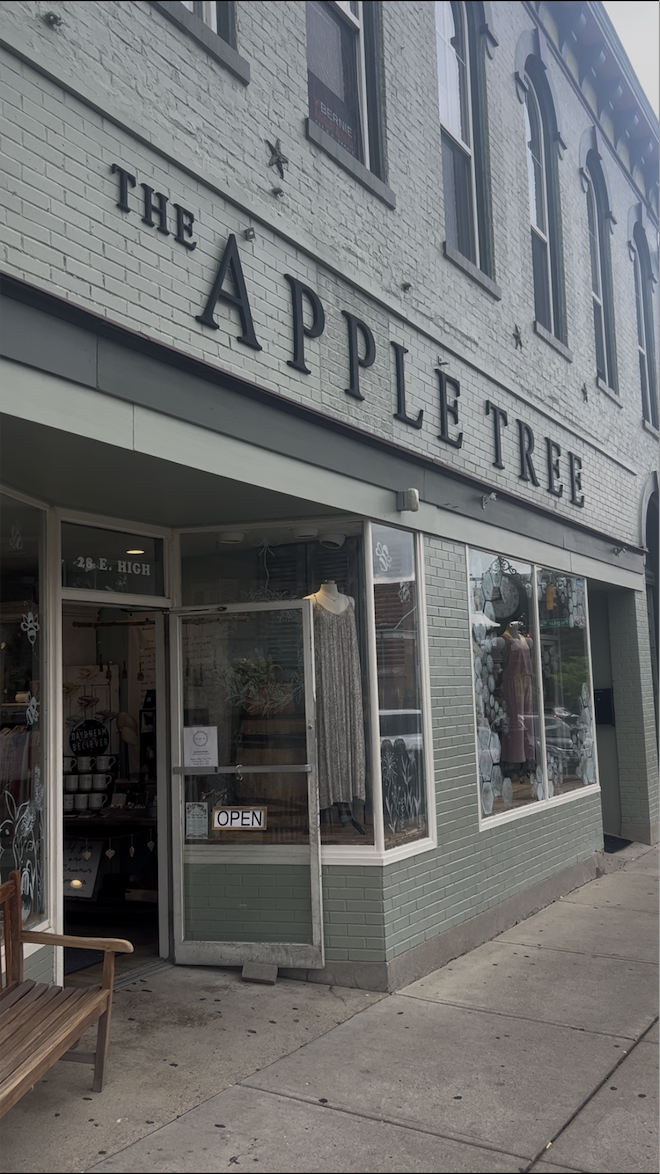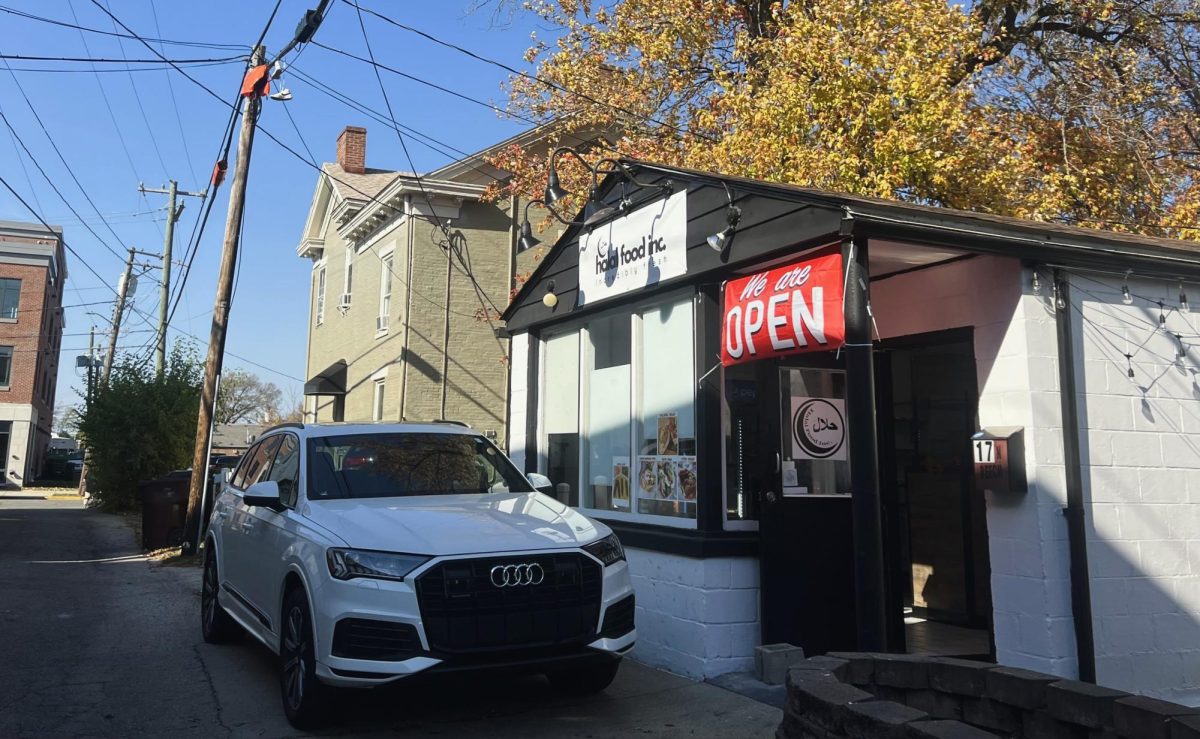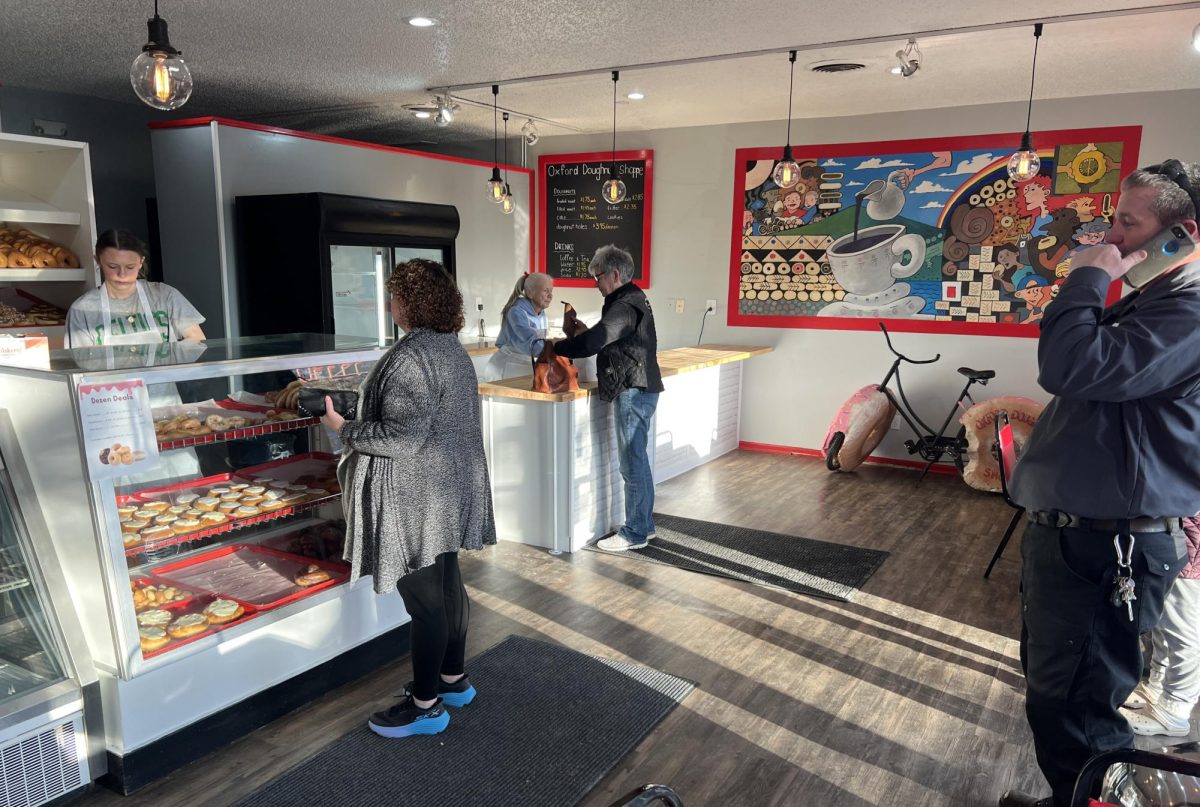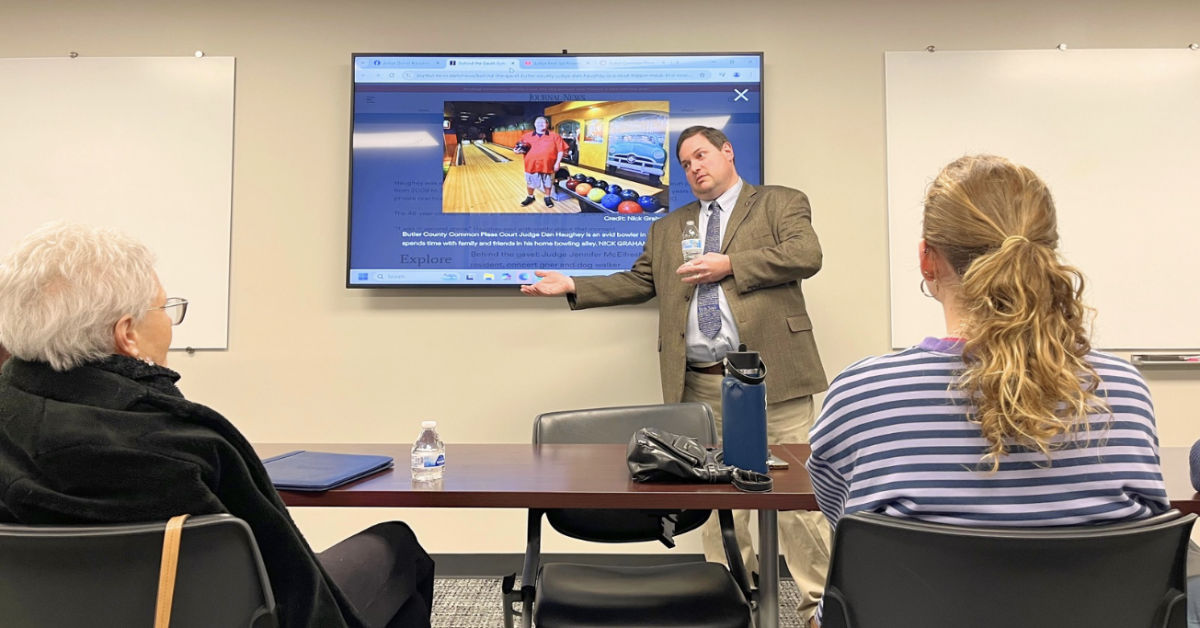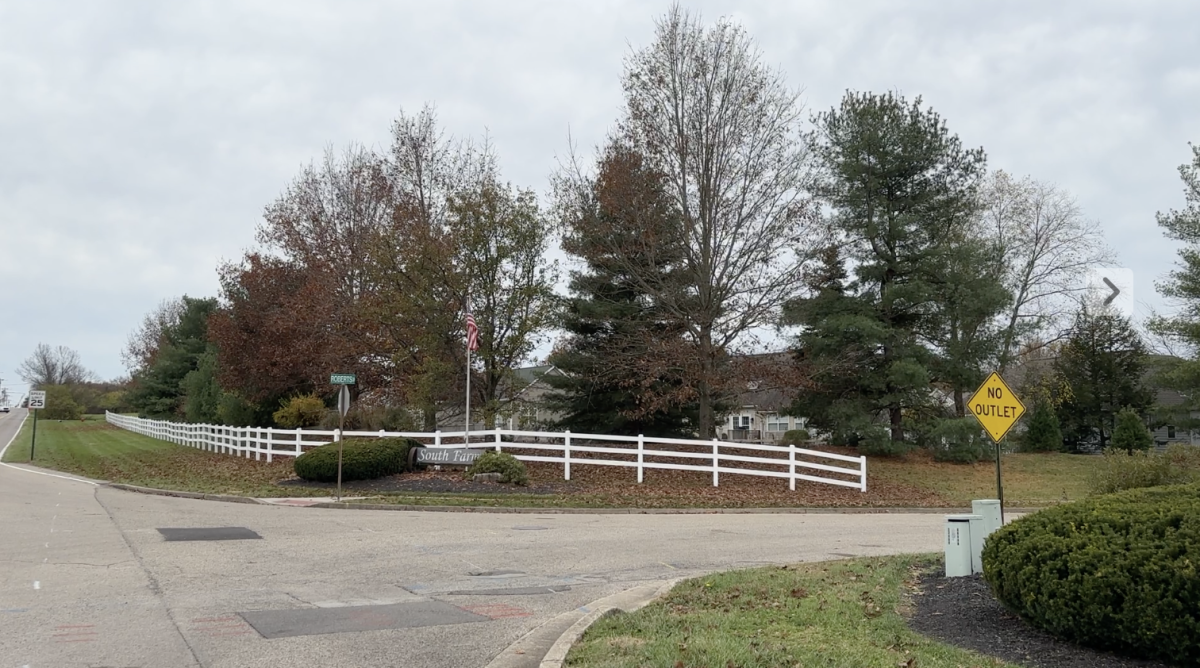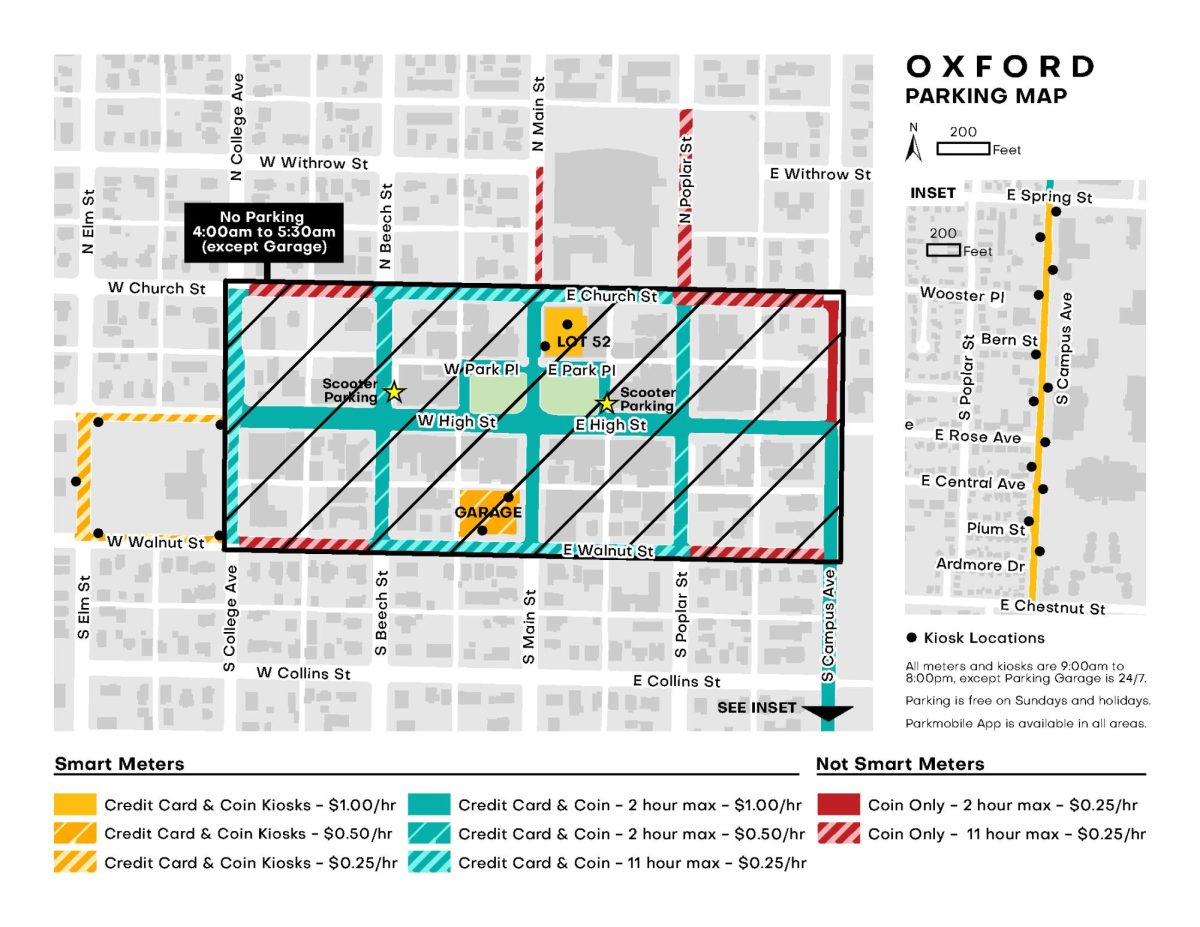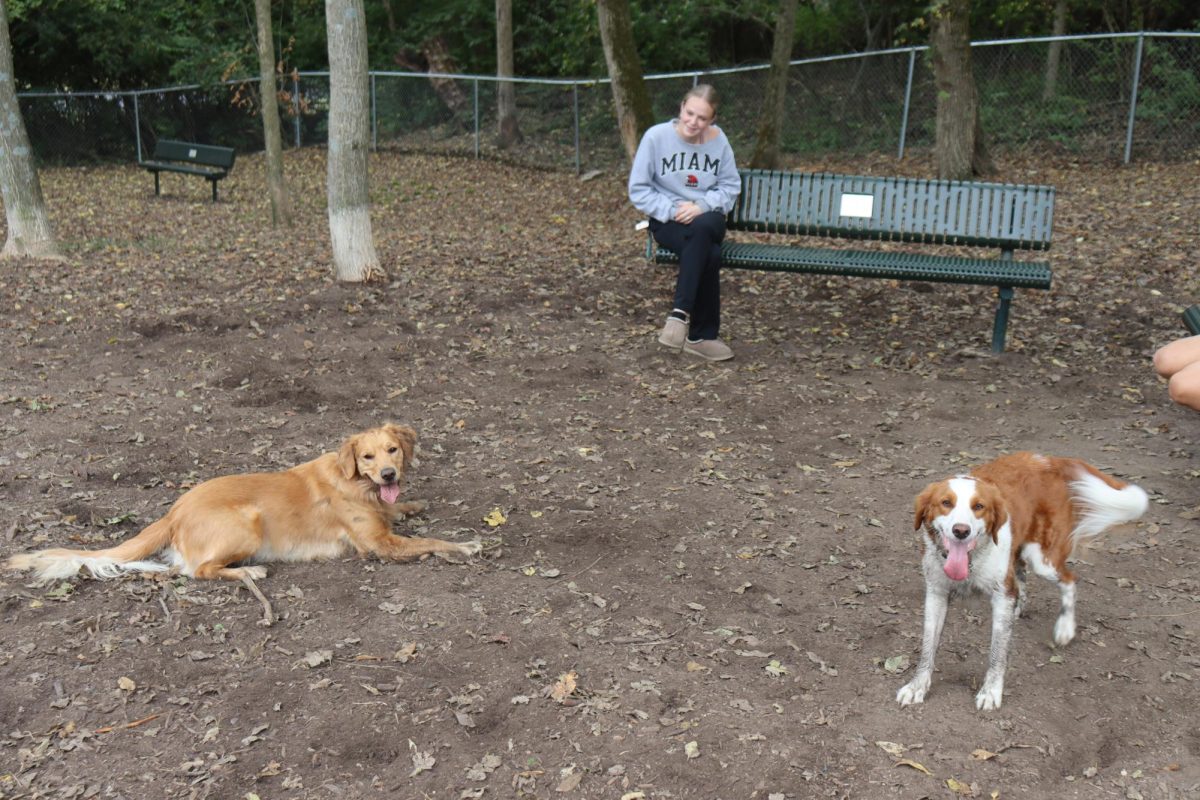A one-year electric scooter pilot program should begin in Oxford within the next 10 days, according to Jeremy Lynch, representative of Bird Rides Inc.
The city has identified two parking spaces Uptown that will be reserved for the scooters. At a meeting of the Student Community Relations Committee on Sept. 21, Lynch said about 100 of Bird’s scooters will soon be available for use around the city.
According to Molly O’Donnell, Associated Student Government secretary of infrastructure and sustainability, a second company, LimeBike, is expected to have another 150 scooters in town within the next three or four weeks.
Whether or not these scooters will ever be seen on Miami’s campus is unknown. As of now, they are prohibited because the university has a long list of safety and liability concerns about their operation. Those concerns were spelled out in a letter from the university to Oxford city officials and Bird last week.
But Lynch said Miami’s ban of the scooters on campus won’t stop the company from operating in Oxford. Bird has implemented its pilot program in other college towns, despite not having the support of the local university. Currently, Bird has scooters in West Lafayette, Ind., but lacks a relationship with Purdue University.
“It’s not unusual for us to work with the city and not the university,” said Lynch.
Charles Kennick, a student representative on the community relations committee, said he hopes Bird’s response to the letter will “dispel rumors and fears” regarding the program. He said the goal of the program is to offer the most amount of choice to Miami students and Oxford residents.
“Owning a car is not in the means of all students,” Kennick said.
The electric scooters, which have top speeds of about 15 mph, are rented using a cell phone app.
One student representative in attendance at the Sept. 21 meeting, Connor Malleg, referred to the excitement of his fraternity brothers, claiming that “all the guys in the house will be using the scooters.”
Malleg said he usually drives the short distance to Farmer School of Business for class, but the scooters would make commuting to campus easier.
David Creamer, Miami’s senior vice president for finance and business services, sent the city and Bird a list of 17 questions regarding the university’s safety and legal concerns.
Some of Miami’s main concerns include the use of helmets, operation under the influence of alcohol and exploding batteries. Bird responded to the questions in a letter last Saturday.
Creamer said he received Bird’s response on Wednesday and will be meeting with other university officials to discuss whether what the university perceives as the scooters’ dangers outweigh their benefits.
“The university wishes to diminish risks for students and consider the safety of operation on campus,” said Creamer.
Two major questions for Miami are how will they serve the students and what risks Bird will assume.
The university also wants to make sure there is long-term interest in the scooters and they aren’t just a fad.
What is Bird?
According to Lynch, Bird Rides, Inc. is an electric-scooter company that provides “low-cost and environmentally friendly” scooter transportation services to cities and university campuses.
The company’s goal is to reduce carbon emissions by 20 percent by 2020, and their data shows that each ride replaces three-quarters of a car trip.
These scooters help decrease short distance car trips while providing a “fun factor.”
Lynch claimed that they “get you the first and last mile of where you need to go” and are meant to co-exist with current infrastructure.
He also alleged that Bird scooters strengthen connectivity across communities, helping increase commercial revenue in some areas.
Another benefit is the company’s use of employee “chargers” who pick up scooters left around town, meaning that they clean up after themselves.
Lynch said after building a relationship with the university or city, the company offers to remit $1 per vehicle per day to go towards safety and infrastructure programs.
While this system would not generate a substantial amount of revenue for the city, it could result in $100 per day with the initial 100 scooters and potentially more if the number of scooters increases.
Lynch also said that Bird shuts down its scooter rentals at 9 p.m., eliminating night-time use.
All liability remains with Bird, and riders are responsible for their own actions while using the scooters.
How Does It Work?
To begin a ride, riders unlock their Bird using the cell phone app. Once a rider is done, the app requires them to take a picture of their Bird in its parked location.
Charger employees release the Birds to their “nests” between 6-7 a.m.
Each Bird can travel a total of about 15 miles before it requires charging, but Bird employees can locate the scooters via the app to pick them up for recharging, which takes about three hours.
There are no membership fees. Each ride costs an initial $1, and 20 cents is charged for every mile ridden.
According to Lynch, average rides are about a mile or less, and can last between 8-10 minutes, totaling about $3.
Users can spend a maximum of $100 per day for the scooters.
Safety
The sleek black scooters weigh approximately 30 pounds, advertising the white Bird logo with reflectors on both sides.
Ending Bird use at 9 p.m. eliminates people coming out of bars at night from being able to use them.
Kickstands help keep the scooters stay upright and prevent the littering of scooters on sidewalks.
To operate a Bird scooter, riders must be 18 years of age.
The Bird app requires users to upload pictures of their driver’s license and to view safety and operation instructions before use. These instructions can be customized by the company to reference local laws and regulations and the company insists that riders adhere to all bike laws.
Users also sign a rental agreement, in which riders assume liability for their actions while operating Bird scooters.
Riders must wear helmets while operating their Bird. The company provides helmets for $1.99, but has provided over 50,000 free helmets for its users around the country. Bird often gifts city police departments with 50 to 100 helmets, which can be used by riders for free.
Injury frequency is 1 in every 30,000 rides, according to the company.
Bird values the user privacy, but said it will provide police with user information if presented with a subpoena.
The scooters will not be put out for use during inclement weather or snow.
The customer service number can be found in the app, and a community mode option allows riders and non-riders to report misuse and safety concerns.
Bird Tracking
The company advertises its advanced data collecting technology which is used to track the scooters’ movement. They use the collected data to decide where to locate nests and how many scooters should be placed in the area.
Usually, Bird increases its scooter population when the average number of rides surpasses three rides per scooter per day and advises one scooter for every 30 students.
GPS tracking technology tracks if scooters are being driven illegally on sidewalks or in no-ride zones.
Job Opportunities
The company brings not only electric scooters but plenty of job opportunities.\To become a charger, users register with the company and send them their local address.
Bird prohibits charging of its scooters in dorm rooms and will not hire a charger who lives on campus.
Chargers must own a car for the transportation of the scooters.
Bird pays chargers $5 per Bird per day, and offers up to $20 for abandoned scooter pickup.
The company maintains a 3:1 Bird to charger ratio, so there are plenty of available chargers to help monitor Bird use.
The chargers are responsible for removing inappropriately parked scooters, and can relocate them within two hours.
Local account managers serve as the main point of contact for community concerns.
The company also hires “Bird Watchers” and Safety Ambassadors who oversee and report bird misuse around the city.
Bird also hires brand ambassadors, who are individuals with large social media followings.
Their responsibilities include offering free services to campus leaders and connecting with specific campus demographics such as faculty, staff and international students.
More details and other job opportunities can be found on Bird’s website.


